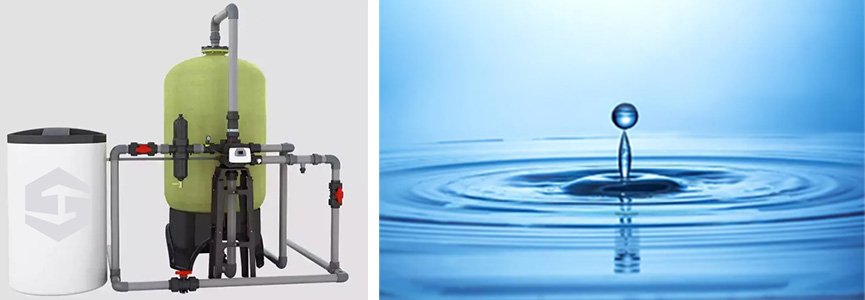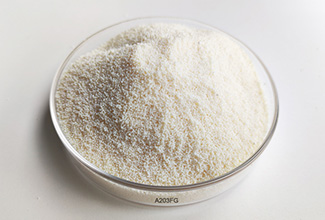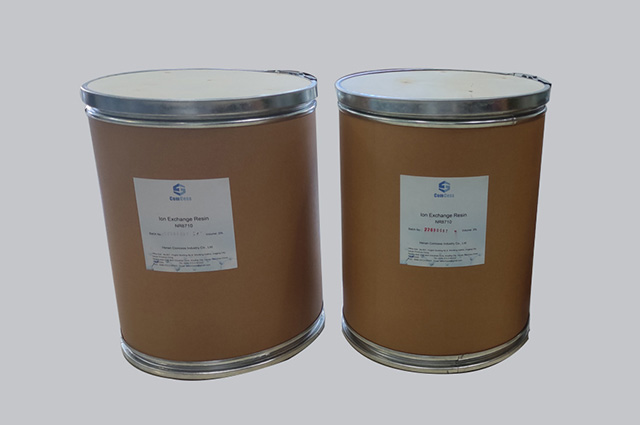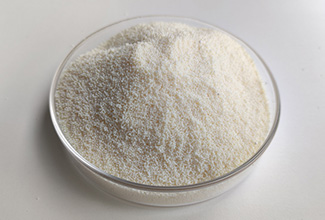
Application
Ion Exchange for Water Softener
Water softening is the process of removing soluble salts such as calcium and magnesium from hard water. COMCESS provide cation exchange resins for water softening.
Application
The hardness of water is mainly composed of cations: calcium and magnesium ions. Water softening is the process of removing soluble salts such as calcium and magnesium from hard water. The water with higher hardness is passed through a filter device composed of a cation exchanger, and the Na and NH4 ions in the cation exchange resin are exchanged with Ca, Mg and other ions that form hardness in the water, so that the water with higher hardness is converted into low-hardness water. When the exchangeable ions of the ion exchanger in the filter tank are exhausted, the existing solution containing the original ions with high concentration can be used to pass through the filter layer to supplement the consumed ions and restore the original exchange force of the ion exchange resin.

COMCESS manufactures many different types of cation exchange resin products. Cation exchange resins are divided into gels type strong acid cation and macropores strong acid cation. Macroporous polystyrene resins have a stronger pore structure than polystyrene gel resins, so macroporous resins can be used as catalysts and can also be used for non-polar applications that are not suitable for gel resins. This results in a resin that is more permeable and oxidatively stable and less prone to mechanical damage. Therefore, strong acid cationic macroporous ion exchange resins generally offer a higher selection than their gel counterparts.
Application of strong acid cations:
●Industrial wastewater treatment and domestic drinking water softening, water desalination treatment
●Amino acid recovery
●Food grade sugar liquid decolorization and ash removal
●Hydrometallurgy
●Biodiesel purification
Antibiotic purification in the pharmaceutical industry

COMCESS manufactures many different types of cation exchange resin products. Cation exchange resins are divided into gels type strong acid cation and macropores strong acid cation. Macroporous polystyrene resins have a stronger pore structure than polystyrene gel resins, so macroporous resins can be used as catalysts and can also be used for non-polar applications that are not suitable for gel resins. This results in a resin that is more permeable and oxidatively stable and less prone to mechanical damage. Therefore, strong acid cationic macroporous ion exchange resins generally offer a higher selection than their gel counterparts.
Application of strong acid cations:
●Industrial wastewater treatment and domestic drinking water softening, water desalination treatment
●Amino acid recovery
●Food grade sugar liquid decolorization and ash removal
●Hydrometallurgy
●Biodiesel purification
Antibiotic purification in the pharmaceutical industry
Related Products
-
 A203FG Food Grade Macroporous Strong Base AnionAppearance: Milky white opaque spherical particleIonic form:Cl-Volume complete exchange capacity(mmol/ml):≥1.2
A203FG Food Grade Macroporous Strong Base AnionAppearance: Milky white opaque spherical particleIonic form:Cl-Volume complete exchange capacity(mmol/ml):≥1.2 -
 Wire Cut EDM Resin Mixed Bed Ion Exchange ResinAppearance: Yellow-brown spherical particles.Ionic form:H+/OH-Volume complete exchange capacity(mmol/ml):≥0.6
Wire Cut EDM Resin Mixed Bed Ion Exchange ResinAppearance: Yellow-brown spherical particles.Ionic form:H+/OH-Volume complete exchange capacity(mmol/ml):≥0.6 -
 D201 Macroporous Strong Base Anion Exchange ResinAppearance: Milky white or light gray opaque spherical particles.Ionic form:Cl-Volume complete exchange capacity(mmol/ml):≥1.2
D201 Macroporous Strong Base Anion Exchange ResinAppearance: Milky white or light gray opaque spherical particles.Ionic form:Cl-Volume complete exchange capacity(mmol/ml):≥1.2

